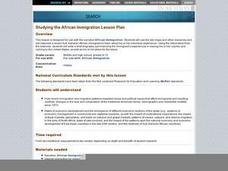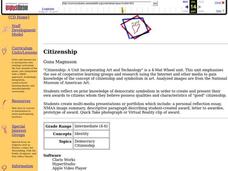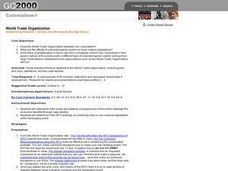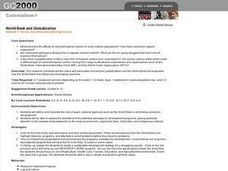Curated OER
Studying the African Immigration Lesson Plan
Students read a narrative, conduct an interview and write an autobiographical piece highlighting their findings about an immigrant's experience leaving their country.
Curated OER
Is It Hog Wash, or Not?
Students investigate pathogens that can be present in pork products and summarize the responsibilities of pork farmers in ensuring the safety of their products. They also investigate the affects of hog farming on the environment and...
Curated OER
Citizenship
Students reflect on characteristics of good citizens, examine democratic symbolism, create an award and choose an individual to receive the award as part of this lesson on citizenship. Lesson ties together social studies, language arts,...
Curated OER
Alexander Graham Bell's Patent for the Telephone and Thomas Edison's Patent for the Electric Lamp
Students read a short biographical account about Bell and student B about Edison. Ask each pair to exchange information and determine what qualities these inventors shared. Ask students if they think all inventors share these qualities.
Curated OER
Ancient Egypt
Learners use the Internet to gather information on Ancient Egypt. They describe the role of a pharaohs and what they wore and ate. They discuss why the Nile is important to the region and examine hieroglyphics.
Curated OER
Brillant, Beautiful Bats!
Students use the internet to gather information on bats. They write their own bat poem and describe the differences between the parts of a bat's body. They identify how bats are important to humans and how they control the insect...
Curated OER
Philanthropists: Past, Present, Future
High schoolers explore the concept of philanthropy. In this philanthropy lesson, students compare the work of antislavery activists to work of philanthropic activists today. Student implement a plan to share kindness with others.
Curated OER
Why We Trade: Exchanging Goods and Services
Students conduct simple bartering and trading activities and consider how product value can be altered by the market.
Curated OER
The Global Warming Cover-Up
Learners explore the basic background on the causes of global climate disruption and governmental and economic reasons for downplaying its causes. Key reasons why US citizens have largely ignored the issues are examined in this lesson.
Curated OER
The IMF in Action: Who is the IMF?
Students use the internet to examine IMF member countries. They work together in groups to read information about the different IMF representatives. They discuss what they have read.
Curated OER
Biomes -- Part 1
Students use the internet to locate and gather information on the world's biomes. They compare and contrast biomes to ecosystems and describe the human effects on ecosystems. They answer questions to end the lesson.
Curated OER
Biomes -- Part II
Students use the internet to gather information on the biomes of the world. They identify the climate and unique characteristics of each biome along with any threat to them. They create their own campaign to preserve wildlife.
Curated OER
Holidays Around the World
Students use the internet to gather information about holidays around the world. They create a calendar with all of the holidays outlined and calculate the percentages of countries who celebrate each one. They design a greeting card to...
Curated OER
Bouncing Balls
Students work together to examine how different types of balls react to colliding with different surfaces. They discover the difference between elastic and inelastic collisions. They practice calculating momentum as well.
Curated OER
External Influences 4: Business Ethics and Moral Behaviour
Students examine the concepts of moral responsibility and business ethics. They apply this knowledge to case studies and practice their evaluation skills. They create suggestions for businesses in dealing with these issues.
Curated OER
World Trade Organization
Students determine if the social and political consequences of free trade outweigh the economic benefits through case studies. They determine of the World Trade Organization willingly or unwillingly aids in neo-colonial exploitation of...
Curated OER
World Bank and Globalization
Students define and describe the role of the World Bank in promoting economic development. They assess the benefits and potential damages to development programs. They evaluate how the World Bank has influenced developing countries.
Curated OER
U.S. Involvement in Nation-Building Before Iraq
Students analyze U.S. involvement in Iraq. In this foreign policy lesson plan, students listen to their instructor lecture on America's nation-building policies. Students respond to questions pertaining to nation-building...
Curated OER
Whose Brain is THAT?!
Students explore various animal brains. In this animal anatomy lesson, students compare and contrast animal brains with the brain of a human. They record several characteristics in a data table for each brain they observe.
Curated OER
To Spread or Not to Spread
Students explore the difference between the three types of contrails. In this contrails instructional activity, students make observations of contrails and record them. Students identify the three types of contrails and complete an...
Curated OER
Magnify That
Students observe many different objects using a magnifying lens. For this magnification lesson plan, students learn that scientists use different tools, and they use the tool to magnify objects in the classroom to see objects in better...
Curated OER
Chapter 9 - Big Business v. Labor
For this 20th century U.S. history worksheet, students read assigned textbook pages regarding the industrialization and labor unions. Students then respond to 50 short answer questions.
Curated OER
The 1932 Election: A Turning Point in History
Students discuss the presidential election in 1932. For this U.S. history lesson, students compare and contrast the differences between the Hoover administration and the administration of FDR. Students work in groups and present the...
Curated OER
Cultures Around the World
Students examine the types of celebrations around the world. They create pictures of animals speaking another language than their own and draw flags of countries around the world. They also retell a folktale to their classmates.























